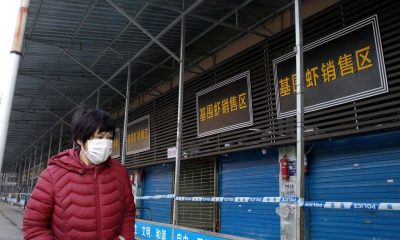Business
Fannie-Freddie Profit Sweep Draws U.S. Supreme Court Review
(Bloomberg) — The U.S. Supreme Court agreed to decide whether investors can challenge the 2012 agreements that let the federal government collect hundreds of billions of dollars of Fannie Mae and Freddie Mac’s profits.The justices said they will hear an appeal by President Donald Trump’s administration of a ruling that would force the government to defend against a shareholder lawsuit. The investors say the agreements exceed the authority of the Federal Housing Finance Agency, which regulates the two mortgage giants.Fannie jumped 5.7% to close at $2.22 in New York trading, while Freddie rose 6.7% to $2.23.A ruling in the investors’ favor would give them a chance to collect a massive settlement. Fannie and Freddie have paid more than $300 billion in dividends to the Treasury under the so-called net-worth sweep.The administration told the court the dispute “is of immense practical importance.” The justices will hear the case in the nine-month term that starts in October.The Supreme Court on Thursday also agreed to hear an appeal from shareholders challenging the profit sweep under a different legal theory.Fannie Mae and Freddie Mac keep the U.S. housing market humming by buying mortgages from lenders and packaging them into bonds that are sold to investors with guarantees of interest and principal.‘Cloud of Uncertainty’After the housing market cratered in 2008, the companies were put into federal conservatorship and sustained by taxpayer aid. They have since returned to profitability and paid $115 billion more in dividends to the Treasury than they received in bailout funds. Since 2013, most of their profits have been sent to the Treasury under the net-worth sweep.The administration contends the 2008 law that set up the FHFA precludes lawsuits that challenge the profit sweep. The law bars courts from doing anything to “restrain or affect the exercise of powers or functions of the agency as a conservator.”A splintered New Orleans-based federal appeals court let the lawsuit go forward, saying the FHFA wasn’t acting as a conservator when it agreed to the net-worth sweep.The suing shareholders said the appeals court reached the right conclusion. But they nonetheless urged the Supreme Court to hear the Trump administration appeal, saying all sides would benefit from clarity.“So long as there is a credible threat that litigation will invalidate the net-worth sweep, a cloud of uncertainty will hang over the companies’ capital structure,” the shareholders told the Supreme Court. “Investors will not be willing to supply the tens of billions of dollars in new capital that are essential to Treasury’s reform plan.”Shareholders in the New Orleans court said that the FHFA, which has a single director who can’t be fired without cause, has an unconstitutional structure, making its decision to enter the profit sweep invalid. While the divided New Orleans court agreed with shareholders that the FHFA’s structure is unconstitutional, it said that fact alone could not invalidate the sweep, leading to the shareholder appeal.“FHFA looks forward to the U.S. Supreme Court taking up” the case and clarifying the issues involved, the agency said in a statement.Trump administration officials, including Treasury Secretary Steven Mnuchin, have long stated that they want to end federal control by releasing Fannie and Freddie from conservatorship. Wall Street analysts have said they are skeptical of that happening before the November election, meaning the administration’s goal largely depends on Trump winning a second term.The government’s appeal is Mnuchin v. Collins, 19-563, and the shareholders’ appeal is Collins v. Mnuchin, 19-422.(Closes shares, adds FHFA statement starting in 3rd paragraph)For more articles like this, please visit us at bloomberg.comSubscribe now to stay ahead with the most trusted business news source.©2020 Bloomberg L.P.
Business
Lopez holding firm reports 26% profit decline during pandemic
First Philippine Holdings Corp. (FPH) saw its net profit in the first semester fell by 26% to P3.5 billion as the pandemic pulled down its income from operations.
In a regulatory filing, the Lopez-led holding company saw its topline falter by 21% to P53.9 billion on reduced power and real estate sales.
The company incurred one-off losses due to coronavirus pandemic-related expenses, which reached P235 million. Excluding these, its recurring net income in the period stood at P10.2 billion, lower by 21% from over a year ago.
FPH’s electricity sales declined by 18% to P10.4 billion on lower revenues from First Gen Corp.’s natural gas plants, hydro platform, and geothermal unit.
The power company in a separate disclosure said its recurring attributable profit dwindled by 15% to P6.7 billion in the first half of the year as the decline in power demand worsened in the second quarter when the economy entered into recession.
Its total revenues from power sales fell by 15% to P47.7 billion in the January-June period. First Gen’s natural gas plants delivered P4.5 billion to the holding firm’s recurring revenues, down 16% as it continues to suffer from low electricity sales in the second quarter. Making up 61% of their parent’s revenues, the gas plants posted a 17% drop in earnings due to lower average natural gas prices and a decline in their dispatch.
Energy Development Corp. posted a slightly lower earnings’ share of P2.4 billion because of a slump in revenues from lower electricity prices. It netted P2.4 billion in revenues, forming 36% of First Gen’s topline.
Its hydro platform, First Gen Hydro Power Corp., brought in P200 million, a 68% share decline, due to lower prices at the Wholesale Electricity Spot Market (WESM). Its revenues, which account for 2% of its parent’s earnings, plunged by 47% to P900 million on poor spot market sales.
Meanwhile, FPH’s real estate sales dropped by over half, or 52%, to P2.2 billion because of the combined reduced sales take-up and slow construction completion of Rockwell Land Corp. following quarantine restrictions.
It also earned 23% less from contracts and services, which stood at P3.2 billion, because of the slowdown in construction activities and drilling services of First Balfour, Inc. and ThermaPrime Drilling Corp., as well as the reduced lease revenues of Rockwell’s commercial spaces due to rent concessions.
Merchandise sale earnings dropped by 26% to P805 million as First Philippine Electric Corp. sold fewer electrical transformers after its plant went on a shutdown.
On Friday, shares in FPH inched up 0.25% to close at P59.15 each, while First Gen’s shares declined by 3.83% to close at P22.60 apiece. — Adam J. Ang
Business
How a hair-care company went from salon supplier to sanitizer powerhouse
When AG Hair moved into its new, 70,000-sq.-foot, state-of-the-art manufacturing facility in Coquitlam, B.C., two years ago, it was part of a plan to supercharge expansion of its hair care product line to salons in international markets. Europe was next on its list. Then COVID-19 hit.
Not only was the European expansion put on hold, but salons in major markets across Canada and the United States were temporarily closed. Very few were purchasing hair products, so manufacturing was halted in mid-March, leaving most of the company’s 82 employees out of work.
AG Hair could have waited out the pandemic but instead decided to lean into its entrepreneurial culture and make a sharp pivot. It began providing hand-sanitizing products for front-line health-care workers, addressing a global shortage.
“We realized there was this massive need for health-care professionals, and we wanted to make a difference and be able to provide them with the products they needed,” says AG Hair CEO Graham Fraser.
AG Hair received Canadian and U.S. approvals a week after applying for the licences needed to make sanitizer, and produced samples to show local authorities within 48 hours.
AG Hair’s Coquitlam facility has pivoted to making hand sanitizer (Photograph by Alana Paterson)
“That rapid response time, and the fact that we had gone through all of the Health Canada regulatory hurdles, showed [the local health authorities] that we were a partner they could trust and someone they could look to, to deliver the products they needed,” Fraser says.
Within a month, the company started pumping out the products, first for the health-care industry, then for consumers on its own website and on Amazon. About 10 per cent of AG Hair’s hand-sanitizer production also went to people in need, as identified by organizations such as United Way.
Parallel 49 Brewing Company is also using AG Hair’s Coquitlam manufacturing facility to produce its own blend of liquid hand sanitizer for front-line health and emergency workers, in partnership with the B.C. government.
Fraser credits his team for its energy and creativity in making the hand-sanitizer production happen, and helping put AG Hair staff back to work.
“We realized we had an opportunity . . . and then it became this incredible, almost war-room mentality and collaboration with our owners, our executive team and our people to say, ‘How are we going to get through this?’ ” Fraser recalls. “I think our success speaks to the type of people we have and the entrepreneurial spirit of pursuing every avenue we have, understanding how we can produce the products and making it happen.”
AG Hair’s commitment to investing in future growth is a big part of what makes it a Best Managed company, says Nicole Coleman, a partner at Deloitte and co-lead of its Best Managed Program in B.C.
“Capability and innovation come through quite strongly with this company,” says Coleman, who is also AG Hair’s coach at Deloitte. “I don’t think they would be able to pivot as quickly if they weren’t so strategic and had the internal capabilities to do it.”
The manufacturing facility was a big investment, but one Coleman says has already paid dividends.
“They were looking forward with a strategic plan in mind about future growth and how they could expand, rather than just focusing on the day to day,” she says. “Best Managed companies are always pushing the envelope and are conscious about planning for the future.”
AG Hair was founded in Vancouver in 1989 by hairstylist John Davis and graphic artist Lotte Davis. The husband-and-wife team began bottling hair products in their basement and selling them direct to salons from the back of a station wagon.
The company eventually moved its manufacturing off-site, to a third party. One day, John went to watch the operations and was surprised to see salt being poured into the mixture. Although he was told salt is commonly used as a thickener, he didn’t like the potential side effects of dry hair and skin.
It was at that moment John decided the company would oversee its own manufacturing. “Through that experience, John also became an expert in product development,” says Fraser, who came to the company in 2000 as director of sales.
After having worked for more than two decades at PepsiCo and Kraft Foods, Fraser was eager to work at a smaller, more agile company where he felt he could help make a difference.
“It was perfect because I got to bring a lot of structure and process that I learned in those organizations, but I also learned an awful lot about being an entrepreneur from John and Lotte: that sense of urgency, the decision-making process, the need to get things done and drive things forward and pursue opportunities,” he says.
Fraser has helped drive AG Hair’s expansion into the U.S. and internationally, including Australia, Taiwan, and Central and South America. A portion of its sales go to One Girl Can, a charity founded by Lotte that provides schooling, education and mentoring for girls in sub-Saharan Africa.
Fraser also oversees the development of new, trending products, including a new deep-conditioning hair mask made with 98 per cent plant-based and natural ingredients. Hand-sanitizing spray and gel will be the latest addition to the company’s product lineup.
“We don’t see the demand [for hand-sanitizing products] going away,” he says. “As the isolation policies start to get lifted, people are going to need forms of security and protocols as they get back into regular life and work. We see there’s going to be a need for these types of products long-term.”
This article appears in print in the June 2020 issue of Maclean’s magazine with the headline, “Working out the kinks.” Subscribe to the monthly print magazine here.
The post How a hair-care company went from salon supplier to sanitizer powerhouse appeared first on Canadian Business - Your Source For Business News.
Business
Amazon Considers Relocating Some Employees Out of Seattle
(Bloomberg) — Amazon.com Inc. is offering Seattle-based employees a choice of smaller offices outside the city, suggesting the Covid-19 outbreak and a new local employers tax have pushed the e-commerce giant to consider alternatives to its hometown.In a message to employees Thursday, Amazon asked which communities near Seattle — including Tacoma and Redmond, Washington — they’d prefer. The title on the message, which was shared on Reddit and later deleted, was “office workplace options.” Amazon declined to comment on the matter.Amazon, which reported a total global workforce of almost 877,000 as of June 30, has been expanding beyond Seattle for years. It is building a second major office center in suburban Virginia near the nation’s capital and has satellite locations in cities including New York, Austin and Los Angeles.The company has threatened to focus employment growth outside Seattle due to a rocky relationship with city officials and new taxes imposed on big employers. The message suggests Amazon could significantly shrink its presence in its hometown, where it employs about 50,000 people in a mixture of offices it owns and leases. In 2019, it announced it would relocate its worldwide operations division, which oversees Amazon’s shipping and logistics, to nearby Bellevue where it currently employs 3,000 people.Even before the pandemic, Amazon considered building more satellite offices outside the city, according to a person familiar with the matter. The company plans to expand its Bellevue offices, which it has had since 2017. Such locations are seen as an amenity for employees tired of commuting to Seattle and as a way to reduce the company’s exposure to the city’s taxes targeting big employers, said the person, who asked not to be identified discussing private matters.Two years ago, Amazon helped defeat an effort in Seattle to raise money for homeless services and affordable housing by levying a per-employee tax on large businesses. The “head tax” would have raised about $47 million a year.The political climate has since shifted against the company after Amazon’s big spending on a Seattle City Council election backfired last year. In July, the council passed a new levy that will tax large businesses on employees who make at least $150,000 per year. The tax is expected to raise more than $200 million annually and cost Amazon even more than the earlier proposal.For more articles like this, please visit us at bloomberg.comSubscribe now to stay ahead with the most trusted business news source.©2020 Bloomberg L.P.
-
 Business4 weeks ago
Business4 weeks agoBernice King, Ava DuVernay reflect on the legacy of John Lewis
-
World News3 weeks ago
Heavy rain threatens flood-weary Japan, Korean Peninsula
-
 Technology3 weeks ago
Technology3 weeks agoEverything New On Netflix This Weekend: July 25, 2020
-
Finance3 months ago
Will Equal Weighted Index Funds Outperform Their Benchmark Indexes?
-
Marketing Strategies7 months ago
Top 20 Workers’ Compensation Law Blogs & Websites To Follow in 2020
-
 World News7 months ago
World News7 months agoThe West Blames the Wuhan Coronavirus on China’s Love of Eating Wild Animals. The Truth Is More Complex
-
Economy10 months ago
Newsletter: Jobs, Consumers and Wages
-
 Finance8 months ago
Finance8 months ago$95 Grocery Budget + Weekly Menu Plan for 8

